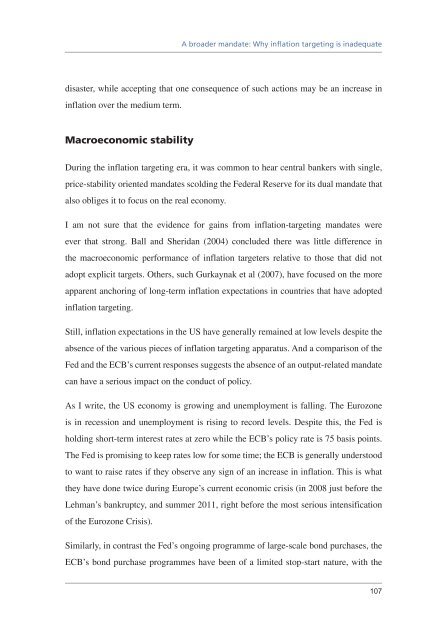Is inflation targeting dead? Central Banking After the Crisis - Vox
Is inflation targeting dead? Central Banking After the Crisis - Vox
Is inflation targeting dead? Central Banking After the Crisis - Vox
You also want an ePaper? Increase the reach of your titles
YUMPU automatically turns print PDFs into web optimized ePapers that Google loves.
A broader mandate: Why <strong>inflation</strong> <strong>targeting</strong> is inadequatedisaster, while accepting that one consequence of such actions may be an increase in<strong>inflation</strong> over <strong>the</strong> medium term.Macroeconomic stabilityDuring <strong>the</strong> <strong>inflation</strong> <strong>targeting</strong> era, it was common to hear central bankers with single,price-stability oriented mandates scolding <strong>the</strong> Federal Reserve for its dual mandate thatalso obliges it to focus on <strong>the</strong> real economy.I am not sure that <strong>the</strong> evidence for gains from <strong>inflation</strong>-<strong>targeting</strong> mandates wereever that strong. Ball and Sheridan (2004) concluded <strong>the</strong>re was little difference in<strong>the</strong> macroeconomic performance of <strong>inflation</strong> targeters relative to those that did notadopt explicit targets. O<strong>the</strong>rs, such Gurkaynak et al (2007), have focused on <strong>the</strong> moreapparent anchoring of long-term <strong>inflation</strong> expectations in countries that have adopted<strong>inflation</strong> <strong>targeting</strong>.Still, <strong>inflation</strong> expectations in <strong>the</strong> US have generally remained at low levels despite <strong>the</strong>absence of <strong>the</strong> various pieces of <strong>inflation</strong> <strong>targeting</strong> apparatus. And a comparison of <strong>the</strong>Fed and <strong>the</strong> ECB’s current responses suggests <strong>the</strong> absence of an output-related mandatecan have a serious impact on <strong>the</strong> conduct of policy.As I write, <strong>the</strong> US economy is growing and unemployment is falling. The Eurozoneis in recession and unemployment is rising to record levels. Despite this, <strong>the</strong> Fed isholding short-term interest rates at zero while <strong>the</strong> ECB’s policy rate is 75 basis points.The Fed is promising to keep rates low for some time; <strong>the</strong> ECB is generally understoodto want to raise rates if <strong>the</strong>y observe any sign of an increase in <strong>inflation</strong>. This is what<strong>the</strong>y have done twice during Europe’s current economic crisis (in 2008 just before <strong>the</strong>Lehman’s bankruptcy, and summer 2011, right before <strong>the</strong> most serious intensificationof <strong>the</strong> Eurozone <strong>Crisis</strong>).Similarly, in contrast <strong>the</strong> Fed’s ongoing programme of large-scale bond purchases, <strong>the</strong>ECB’s bond purchase programmes have been of a limited stop-start nature, with <strong>the</strong>107














